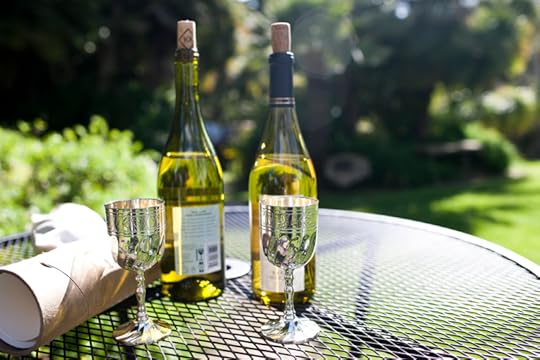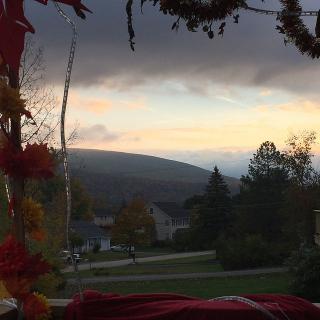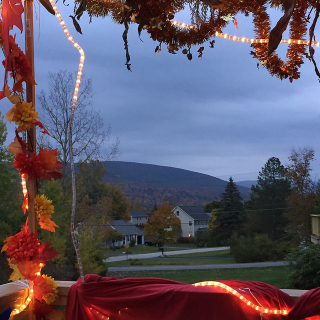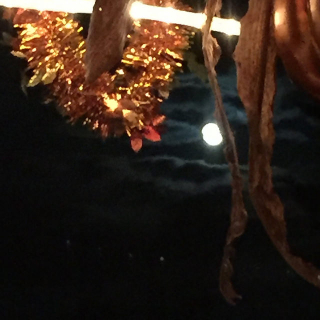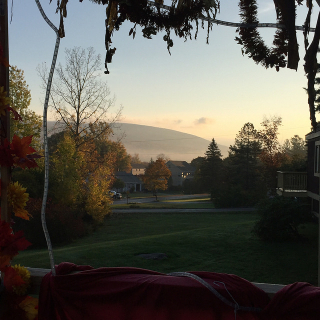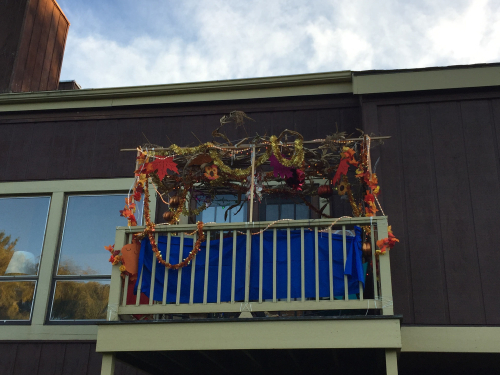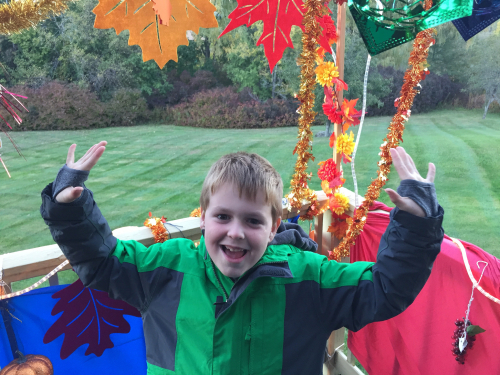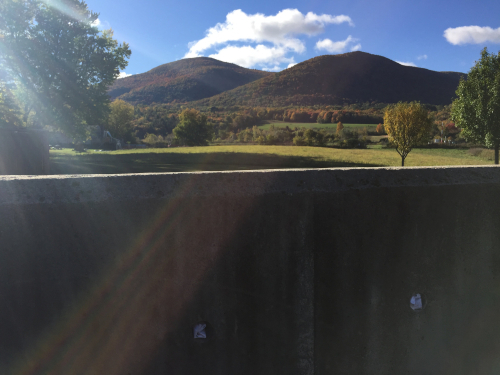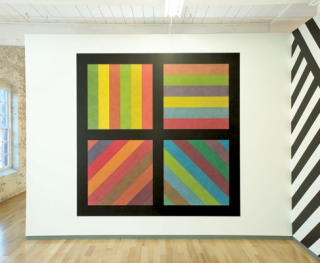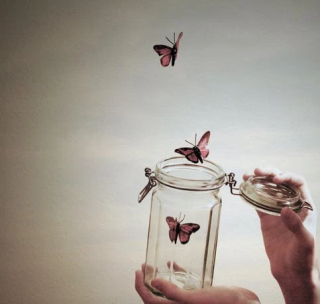Rachel Barenblat's Blog, page 97
October 23, 2016
Hoshanot after the end of a marriage
1.
I feel for these willows,
clipped from the tree
they never imagined
would stop being home.
Packaged and moved,
unpacked and shaken:
blackening at the edges,
shriveling and curling
leaves bedraggled now,
ready to come apart.
We beat our branches
against the earth.
I fling myself down too.
Let the rains fall.
2.
From loneliness
wrapped around me like a tallit.
From nights when the house
is too quiet.
From the relentlessness
of responsibility.
From wondering
what I should have done.
From imagining a life
that's not this one.
From self-blame.
From the ocean of grief.
From wishing I had an "us"
I could ask God to save.
3.
The sukkah begins to come apart.
Wind and rains unravel its garlands,
knock the cornstalks askew.
This is its purpose: to remind me
how to celebrate what can't last.
How to grasp its beauty with both hands
and then open my fists, let
the chapter be over. How to trust
there will be more abundance.
How to rejoice in what I don't yet have.
The ebb and flow will carry me to shore,
and I'm not crossing the sea alone.
Salt has scoured me clean. Drench me
with honey, sweeten every decree.
Today is Hoshana Rabbah, the seventh day of Sukkot. It is its own mini-holiday within the bigger holiday. (For more on that, see Three more holidays at the very end of Sukkot, 2012.)
We beat our branches / against the earth. On this day it is customary to take willow branches and beat them against the ground in an embodied prayer for rain.
From wishing I had an "us" I could ask to save. The day of this festival means "The Great 'Save Us!'" Today it's customary to recite supplicatory prayers called hoshanot, which ask God in a variety of ways to save us. (See Hoshanot, 2010.)
The sukkah becomes to come apart. See Pictures and words (Hoshana Rabbah), 2012.
How to rejoice in what I don't yet have. This is the spiritual work that Sukkot asks of us. See Joy Like Our Lives Depend On It by Rabbi David Evan Markus.
The ebb and flow. I learned from my teacher Rabbi Elliot Ginsburg that the Jewish year, and that spiritual life in general, has an ebb and flow; see The year as spiritual practice, 2009.
I'm not crossing the sea alone. Our daily liturgy includes "Mi Chamocha," the song our ancestors sang after crossing the Sea of Reeds. Often from the bimah, as I play the guitar chords that usher us in to the melody we usually use for this prayer, I remind the room (and myself) that whatever we may be facing -- with the Egyptian army behind us and the sea ahead of us, as it were -- we never have to cross the sea alone. We have each other. We have God. We have the presence of love to companion us in our crossings.
Drench me / with honey, sweeten every decree. Some maintain the custom of continuing to eat challah or apples dipped in honey not only on Rosh Hashanah, but all the way through the holiday season until tomorrow. One tradition holds that today is the day when the "decree," the verdict for the world declared on Rosh Hashanah, is finally sealed. I like to think that though we can't avert whatever life has in store for us, we can seek to sweeten it -- for ourselves, and for each other.
Moadim l'simcha -- wishing you joy in the festival; may this be a season of rejoicing.

October 20, 2016
Lessons Of Divorce in a Cup of Wine
...That was the first part of my divorce ritual that became clear to me: we would pour wine from a single cup into two, symbolizing that our portions in life are now separate. We no longer drink from the same cup. We no longer share life’s joys and sorrows. We do still share a child, and as co-parents to that child we will be connected for the rest of our lives, but each of us drinks now from a separate cup of grief or delight...
That's from my latest in The Wisdom Daily. Read the whole thing: Lessons Of Divorce in a Cup of Wine.
(If this is of interest to you, you might also enjoy the ritual I crafted for ending my marriage.)

October 18, 2016
Who rolls back light before dark and dark before light...
Through the morning clouds
a patch of blue sky beckons
over distant hills.
In the evening
the hillside darkens, purple,
framed by strings of light.
The Sukkot full moon
paints the clouds luminescent,
almost within reach.
Early morning haze
nestles in the near valley.
Sunlight grins, dives in.
The title of this post comes from the evening blessing praising God Who brings on the evening.
(Here's a post containing that prayer, as well as some contemporary renderings thereof, and some poems that work with the same themes: Looking at the prayer for evening in a new light.)
Photos taken from my wee sukkah.

A Hallel for Sukkot
113.
We who serve offer praise.
We who serve by building flimsy houses
out of sticks and string.
We who serve by whisking together honey and coffee,
chesed and gevurah,
to make offerings we bring in cupped hands.
By seeking to sweeten what's bitter.
By speaking our truths, naming what is.
We who serve by hoping for better --
by taking up hammer and nails to build
the redeemed world we didn't inherit:
offer praise.
114.
When we pushed through the narrow place
when we left what had become constriction
we came into our own, we became our own.
Only then could we give ourselves to you.
When we left the household that didn't nurture
when we left old stories that no longer sustained
the ground shifted beneath our feet
the hills leapt like baby goats
the river we thought flowed always toward the sea
turned tidal and became sharp with salt.
Mountains, did you savor letting loose?
River, did you rejoice in changing your course?
We too have been transformed
by the presence of the one whose name is change.
115.
Friends, be profligate with blessings!
Spend them freely,
prime the pump for more.
Children, bless us with wonder
at the calliope song of geese overhead.
Elders, bless us with permission.
The skies belong to God
always perfect
and always changing.
The earth is ours to tend.
We can offer praises right here, right now.
What are we waiting for?
116.
Because you hear me, I am never alone.
I lift the cup of my changes:
your presence sweetens what was bitter.
This sukkah is temporary
but the promises I make to you endure.
Wherever I go, you are with me.
Every place becomes Jerusalem.
117.
Everyone, say thank you.
That we are alive at all
is cause to rejoice.
118.
There are more galaxies than I can imagine.
We are made from the same stuff as the stars.
What burns in me: a spark
from the fire that sustains all creation.
And when I say I love you, I mean
you expand my heart to encompass the universe.
Open the door of my heart:
I have feathered my nest with gratitude.
This is the door to who we really are.
Will you walk through?
Today is the only day there is.
Be glad with me.
Here is a pdf file of the psalms of Hallel: in Hebrew, translated into English, and accompanied by commentary. This poem series is rooted in the psalms of Hallel, which we recite daily during Sukkot (and at other times, too -- though these poems draw imagery from Sukkot, rather than from the other seasons when Hallel is recited.) For those who are interested in the poems' references and citations, some notes follow.
By the by, if you like this kind of thing, you might also like my Six psalms for Hallel written during Pesach several years ago, now published in Open My Lips (Ben Yehuda Press, 2016.)
Notes:
We who serve offer praise. See psalm 113, "Sing praises, you servants of Adonai!" [B]uilding flimsy houses... See A sukkah of sticks and string. [W]hisking together honey and coffee. Many recipes for honeycake, a seasonal treat, involve both honey and coffee. [C]hesed and gevurah. Chesed (lovingkindness) and gevurah (boundaried-strength) are two of the seven divine qualities to which the seven days of Sukkot can be mapped.
When we pushed through the narrow place. See psalm 114, "When Israel went forth from Mitzrayim..." Mitzrayim, "Egypt," can be translated as "the narrow place." Only then could we give ourselves to you. See Psalm 114, "Judah became God's..." [T] he ground shifted beneath our feet. "The Jordan retreated. Mountains leapt like rams..." [T]he river we thought flowed always toward the sea. Some rivers are tidal. (The Hudson is one of them.) The one whose name is change. God describes God's-self to Moshe as "I Am Becoming What I Am Becoming."
Friends, be profligate with blessings! See psalm 115, though I chose to invert the giving of blessing: in this poem we are the ones who are offering blessing to God, instead of the other way around. The reference to youths and elders also hearkens back to this psalm. The skies belong to God. "The heavens are the heavens of Adonai..." We can offer praises right here, right now. "The dead cannot offer praises..."
Because you hear me, I am never alone. See psalm 116: "I love knowing that Adonai listens to my cry..." I lift the cup of my changes. "I raise the cup of my deliverance..." That verse is part of the traditional liturgy for havdalah. The promises I make to you... "I will honor my vows to Adonai..." Every place becomes Jerusalem. "...in the midst of Jerusalem."
Everyone, say thank you. See psalm 117: "Praise Adonai, all nations..."
There are more galaxies than I can imagine. Psalm 118 begins with the assertion that God's love endures forever. L'olam means both space and time, suggesting the infinity of the heavens. Open the door of my heart. "Open for me the door of righteousness." This is the door to who we really are. "This is the door of Adonai..." Today is the only day there is. "This is the day that Adonai has made; let us rejoice and be glad in it."

October 14, 2016
A sukkah of sticks and string
Mirpesset (balcony) sukkah, 5777.
One of the things I knew I would miss about my old house was the sukkah I used to have there. My ex-husband built me a beautiful sukkah -- actually he built several of them, over the years, and he deserves kavod (honor) for that. But at the condo where I now live, we're not allowed to put up structures on the lawns. My son can play soccer with a portable goal, but when he's done we need to bring the goal back to our garage. No swingset, no permanent play structures... and no sukkah, either.
When I moved, I resigned myself to using the synagogue sukkah all week. My shul builds a beautiful sukkah each year, and I live nearby now. It is an entirely reasonable solution. Still, as Sukkot approached, I found myself deeply wistful for the experience of padding out to the sukkah in my pyjamas in the morning to bentsch lulav before breakfast, and the experience of tiptoeing out to the sukkah to gaze at the moon after my son is asleep. I'd gotten spoiled. I liked living with a sukkah in my own backyard.
Then it occurred to me that I could try to build something on my wee mirpesset, a.k.a. the small balcony outside my living room. People build sukkot on balconies in big cities, don't they? I spent a while searching to see what others had done. I looked into fancy tubular sukkah kits of the right dimensions to be built on a small balcony like mine. They tend to be quite pretty, but also quite expensive. I couldn't justify the expense -- not now. Maybe by next year, but it wouldn't be responsible to spend that now.
And then one day I was driving past a local hardware store when I saw tall thin garden stakes, and I remembered a long-ago building project that featured sticks and string. A sukkah made of garden stakes and string might not be stable enough to stand on its own, but because my mirpesset has a railing, I could rely on the existing structure to help hold my sukkah up. It would be a tiny sukkah, of course -- perhaps befitting the inhabitants of a small condo, a downsizing b'chol olamot / in all worlds.
A sukkah is always already a sketch of a house. It's a minimalist line drawing, not an oil painting; its components suggest "dwelling," but it isn't permanent and isn't stable -- indeed, it can't be. A sukkah needs to have a leafy roof through which the stars can be seen, and a certain flimsiness seems appropriate to this harvest festival of impermanence. A sukkah is like the autumn leaves: as soon as it's built in all its splendor it's vulnerable to coming apart at the seams. So, too, are we, of course.
I don't know whether our mirpesset sukkah will last all week -- whether the roof will hold up the cornstalks, whether wind and rain will tear it apart, whether our decorations will blow away and dance across the lawn. But we have already rejoiced in our sweet, sparkly temporary little house. I feel incredibly blessed to have a place of our own where I can build even a tiny sukkah, and to have a kid who takes pleasure in tinsel and autumn leaves, and to have a holiday that drags me outdoors at this season.
Chag sameach -- a joyous festival to all.
Happy kid in the sukkah!

Letters to God from a little boy
At the end of the summer, not this past summer but the one before, I led davenen at my synagogue with Rabbi David Evan Markus. It was such a spectacular Shabbat morning that we decided to set up chairs outside, beside the little wall that extends beyond our building. When we turned east for the bar'chu, the people who were sitting right next to the wall turned and faced the wall in prayer and suddenly several of us made the exact same mental leap: the wall became our mini-kotel. (I wrote about it at the time.) When the Days of Awe rolled around, I tried an experiment: on Yom Kippur I invited congregants to write kvitlach, notes to God expressing whatever they most needed to say, and to tuck them into the holes in that wall as pilgrims tuck notes into the cracks between the stones at the Kotel in Jerusalem.
So many people came up to me afterwards and thanked me for that practice that I resolved to do it again. This year once again, at the close of Yom Kippur morning services, I invited those who are comfortable writing on chag to write notes to God saying whatever they most needed to say and put them in the wall, and I invited those who do not write on holidays to walk out to the wall and place their hands on the wall and take a few moments for silent prayer. And people did so, and I was glad. When the day came to its close, I went outside to collect the notes in order to burn them as I had promised that I would do... and my son, who is going on seven, followed me outside to see what I was doing. I explained to him what the grown-ups had done, and to my surprise, he got upset. "How come I didn't get to write one?"
Then he brightened. "Hey, can I write one now?" I said yes, of course. He took a pad of paper and a pencil and carefully wrote, in his round first-grade handwriting, three separate notes to God. One of them said "Thank You God for the words that we speak." (I told him I think that's a beautiful prayer.) Another was an apology. And the third he kept to himself, and I don't know what it said. Together we rolled them up, and went outside into the moonlight, and tucked them into the holes in the wall. "I don't want you to burn them yet," he said. "I want them to stay there for a few days, because I just put them there, and maybe God hasn't received them yet." I said okay, and we left them there -- scraps of wadded-up paper, holy messages gleaming as white as his Yom Kippur shirt against the velvety darkness of the night.

October 12, 2016
The gates are closing: short words for Ne'ilah
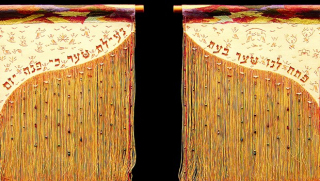 The gates of this awesome day are closing.
The gates of this awesome day are closing.
For twenty-four hours we have gathered together in song, in prayer, in contemplation. We have knocked on our hearts, imploring them to open. We have admitted to ourselves and to God where we habitually fall short. We have tried with all our might to forgive ourselves our mis-steps, our missed marks.
And now the gates are closing.
If there is something for which you still don't feel forgiven; if there is a hurt, whether one you inflicted or one you received, still heavy on your heart; the penance I prescribe is this: work it off with the labors of your heart and hands.
As Yom Kippur ends, the first thing we do is light a candle.
Then we feed each other at the break-the-fast.
And then we put the first nail in the sukkah, connecting Yom Kippur with Sukkot which will begin in four short days.
Light. Sustenance. Shelter. These are our calling in the year to come.
Bring more light to the world: combat ignorance, homophobia and transphobia, fear and mistrust of Muslims and of immigrants, small-mindedness of every kind.
Bring more sustenance to the world: feed the hungry in our community and everywhere.
Bring shelter to those in need: welcome Syrian and Iraqi refugees to Berkshire county. CBI's tikkun olam committee will be working with me in the new year to discern how we can best extend ourselves to support refugees. I hope that everyone in our community will take part.
The verse most oft-repeated in Torah is "love the stranger, for you were strangers in the land of Egypt." And in more recent memory than the Exodus, many of us have parents or grandparents who fled war or persecution. It's incumbent on us to act to care for those in need.
This morning we heard the searing words of Isaiah:
"Do you think that this is this the kind of fast that I want? A day for people to starve their bodies? Do I want you to bow your heads like the reeds, to mortify your bodies with coarse cloth and ashes? You call that a fast, a day when Adonai will look upon you with favor?"
"No! This is the fast I want: unlock the chains of wickedness, untie the knots of servitude. Let the oppressed go free, their bonds broken. Share your bread with the hungry, and welcome the homeless into your home."
This is the work to which Yom Kippur calls us.
The gates are closing. This is the moment when we make the turn -- teshuvah, turning our lives around, re/turning to our highest selves and to our Source -- to build a world redeemed.
More light. More sustenance. More shelter.
For those in need. For refugees. For everyone.
[Image source.] Also posted to my congregational blog.

Your life is your art: a sermon for Yom Kippur morning
I don't know how many of you are MASS MoCA fans, but many of you have probably seen the building of LeWitt wall paintings -- yes? It will be on view until 2033, so if you haven't seen it, you still have time.
My favorite floor is the middle floor. The ground floor features works in pencil and chalk; the top floor features works in psychedelic colors so vivid they almost hurt my eyes; but the middle floor features geometric works in colors that are bright but not painful. That's the floor where I spend the most time.
I've said for years that someday I should paint a LeWitt on a wall in my house. How difficult would it be? All one needs are dimensions and instructions. This summer it occurred to me: I could actually do it. I could make a LeWitt, and have something big, bold, vivid, and colorful to brighten my home through the winter.
Maybe it's because of timing: I began work on my faux LeWitt during Elul, as we began the ramp-up to the Days of Awe. But as I worked on the canvases, I couldn't help thinking about teshuvah, that word so often translated as "repentance" though it actually means "return." The work to which we dedicate ourselves today.
Teshuvah is a process of discernment. Who am I, who have I tried to be, where have I fallen short, what kind of course correction do I need, how can I do better next time? Painting, at least for an amateur like me, has a similar trajectory. I sketched on the canvas where I wanted the different colors to be. Some of the lines needed to be erased and drawn again. And then I looked at my brand-new box of paints and realized I would need to learn how to mix colors. That took trial and error, and often the result wasn't quite what I had imagined.
Just so in the work of teshuvah. We draw lines around what we want our behavior to be. Sometimes the lines aren't in the right place and need to be re-drawn. Sometimes they need to be drawn more firmly, because we lose track of where they are. Sometimes we accidentally paint over the lines, and then have to let the paint dry and go back over it with white paint to try to obscure the brush strokes -- though it's unlikely that we ourselves will forget our missteps, even if we're able to obscure them from everyone else's view.
In teshuvah, as in painting, it behooves us to take the work seriously. If it's worth doing, it's worth at least trying to do well. And... it also behooves us not to take ourselves too seriously. Not to hold ourselves up to an impossible standard and then curse ourselves when we inevitably fall short. Newsflash: I'm a rabbi and a poet, not a modern artist. My painted stripes aren't as perfect as LeWitt's. And I'm a human being, not a bodhisattva or an angel, which means that I struggle to find the right balance of metaphysical "colors", too -- the right balance of lovingkindness and boundaries, gentleness and firmness, with others and with myself.
Teshuvah isn't work we get to do once and then be done with. It's ongoing. That may not be what you want to hear on Yom Kippur -- you may be hoping that when today is over, you'll emerge feeling that your inner work is done! And I hope that you do feel that way, at least a little bit. But I hope you don't feel that way altogether, because I don't think our inner work is ever "done."
Yesterday's canvas is already painted. We can't un-paint it. But tomorrow's canvas awaits. What colors will we mix, what patterns or images will we depict, based on what we learn about ourselves today?
We can't un-paint yesterday, but if we decide we regret yesterday's painting, we might be able to paint over it. That's one understanding of what the name of today means: Kippur relates to the word כפר, which means "pitch," as in the sticky black stuff that Noah was instructed to paint all over the ark to seal it from the waters. Today we have an opportunity to repaint ourselves inside and out, so that we can emerge into the rest of the new year with the old year's mistakes covered-over as though they had never been.
Of course, the old year's mistakes did happen. The places where each of us missed the mark in our relationships with ourselves, with each other, with the community, with the tradition, with our Source -- all of those were real. But today offers the promise that if we examine our mis-steps and truly commit to trying to do better in the new year, God will cover over our mistakes like a painter obscuring the first version of a painting beneath something beautiful and new.
In teshuvah, as in painting, it behooves us not to let the perfect be the enemy of the good. In fact, I have come to think of perfectionism as the voice of the יצר הרע, the "evil inclination." Jewish tradition teaches that each of us is made with a יצר הטוב and a יצר הרע, a good inclination and an evil inclination. This isn't a flaw in our design or something to eradicate: on the contrary, it's essential to who we are.
The Talmud (Yoma 69b) holds that once upon a time the rabbis managed to imprison the yetzer ha-ra, and for the three days that it was imprisoned no eggs were laid throughout the land. There's some kind of essential connection between the yetzer ha-ra and creation, procreation, creativity.
The Hebrew ליצור -- the verb form of that word yetzer, which is usually translated as "impulse" -- ליצור means "to create." In broader terms ליצור means to make art; to create, to form, to mould, to generate. The creative impulse is core to who we are as human beings. When Torah says that we are made in the image and the likeness of the Creator, that's what I believe it means: we too create.
Our lives are our art, and we are the artisans no less than God whom our liturgy names as the יוצר אור, the Creator of Light. The yetzer is the artistic impulse, and we all have it -- whether or not we self-identify as "artists" or "creatives." Maybe you create with paint. Maybe you create through cooking. Maybe you create through words. But all of us create through the ongoing performance art piece we call our lives.
My yetzer ha-ra, my "evil inclination," appears in the voice of perfectionism that tells me I won't be able to do something properly so I might as well not even try. "There isn't time to really daven today with full intention and heart -- skip it." Or "You're not a painter, why are you even trying to create art." Or "He's never going to forgive you, so don't waste your time trying to make amends."
I'm not Sol LeWitt. I'm not even one of the art majors who did the gruntwork of creating three floors of LeWitt artworks at MASS MoCA. But if I listened to my yetzer ha-ra I would never even have tried to make a painting, and that would have been a shame, because it turns out I really enjoy painting. And I love seeing my LeWitt on the wall. Even though it isn't perfect.
And it is better to take ten minutes for spiritual practice, even with imperfect focus, than to skip it altogether because I don't think I will be able to do it "well enough."
And it is better to go to the people with whom I need to make amends, and try to make amends, even if I don't have exactly the right words to say, and even if I can't make everything perfect. Because saying "I'll never be able to live up to my own expectations" is a cop-out: it's a way of giving myself permission not to even try. And that's not what Jewish spiritual practice demands.
I need my yetzer ha-ra to goad me on. I need my yetzer ha-ra to tell me that I could be doing more and better than I am -- just as I need my yetzer ha-tov to remind me to feel good about what I'm doing even when it's not perfection. When the two are in balance, they push and pull me into creating.
One of my favorite teachings about the creation of the universe holds that God created creation because God felt a lack. God felt an ache, an emptiness, a loneliness. So God brought creation into being in order to have something, in order to have someone, with which to be in relationship.
We too create from our own emptiness. We create what's missing in our world. What colors, what qualities, what creation does the world most need from you in the year to come? I venture to suggest that the world needs your tenderness, your compassion, your righteous indignation. Pick up your paintbrush. What kind of you do you want to create?
Our tradition teaches that in every moment the world is spoken into being. Every morning we wake and our souls are pure, no matter how we might think we shmutzed them up yesterday. Every Yom Kippur we do the internal work of reflection and realignment and we emerge with hearts that are clean and clear. All of this is a gift to us from God, from the Universe, from Beyond. Our responsibility, as receivers of these gifts, is to try.
We try to be the best human beings we can be, even though we know we will fail. We try to paint within the lines, and to mix the most beautiful colors we can imagine. And sometimes we screw up and have to do it over again, and sometimes the colors don't come out the way we imagined, and sometimes we hurt each other and have to apologize, and that's okay. In teshuvah, as in art, the only wrong way to make it is not to make it at all.
Your life is your art. Throw yourself into the creative process of making teshuvah. Return again to your own creative power. Together we can make the world bold and vivid, beautiful and kind. Kein yehi ratzon: may it be so.
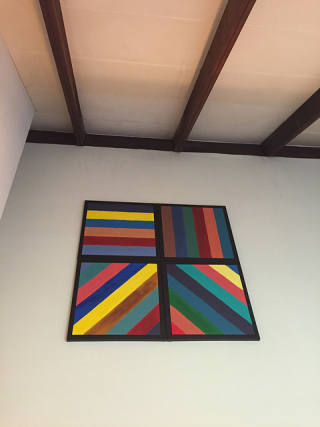
Images: at the top of the post, a Sol LeWitt hanging at MASS MoCA.
At the bottom of the post, my own LeWitt hanging in my living room.
Cross-posted to my congregational blog.

October 11, 2016
Release: a sermon for Kol Nidre
We're not here in this life to be small. Our souls yearn to expand, to live into the fullness of all of who we can become. Yom Kippur is here to help set us free.
Tonight we let go of broken promises. "כָּל נִדְרֵי / Kol nidrei..." All the promises, and the vows, and the oaths. The promises we made that we failed to live up to. The promises we made that it turns out we couldn't keep.
Unkept promises, both those we make and those made to us, become a weight holding us down. What would it feel like to let that weight go?
My teacher Reb Zalman -- Rabbi Zalman Schachter-Shalomi of blessed memory -- wrote a script for releasing ourselves from our promises. The petitioner says:
"In the last year I have from time to time made vows, sometimes speaking them out loud, or had an intention, a resolution to change something in my actions, behavior and attitude in my mind. Some of these are in relation to myself, my body, my mind, and my soul. Some of these deal with the way in which I conduct myself in relation to other people. And most of all, there are those that deal with my relation to God..."
You might imagine that he wrote these words for Yom Kippur. Actually, he wrote them to recite before Rosh Hashanah. There's a custom called התרת נדרים / hatarat nedarim, "untangling of vows." Here's how you do it. You assemble a beit din, a rabbinic court of three. And then each person takes a turn being the person requesting release, while the others serve as judges empowered to grant release.
The ritual acknowledges that resolutions are a kind of vow, and that when we fail to live up to our intentions, we need a mechanism for forgiveness. What moves me is the response from the court of friends: "hearing your regret, we release you."
To release ourselves from the promises we couldn't keep, the first step is to name them, with genuine regret. We speak our mis-steps to someone we trust, and that someone whom we trust says "it's okay, you can let it go." Then? We have to believe them. That last step may be the hardest part.
That ritual is a kind of practice run for the work we're here to do over the next 24 hours, together.
Of course, there's a difference between breaking a promise to someone else, and breaking a promise to oneself or to God. For a mis-step between me and God, Yom Kippur can atone -- but for a mis-step that hurts someone else, Yom Kippur does not atone unless I seek forgiveness first. If I promised you that I would do something, or be something, I have to make amends for the promise I couldn't keep.
Here's an interesting thing. We're required to seek forgiveness in order for Yom Kippur to do its inner work on us and in us -- but even if forgiveness isn't granted by the other person, the fact that we've sought it is what matters. The fact of making teshuvah and earnestly seeking forgiveness opens us up to the spiritual possibility of release.
Tonight we seek release as a community, and that's important. We come together for these 25 hours because doing this together is different from doing it alone. Between tonight and tomorrow night, we spend time in community -- sometimes davening, sometimes in silence, sometimes in remembrance -- and we seek release together. This dates back to ancient times. We read in Torah "כי ביום הזה יכפר עליכם לטהר אתכם... לפני ה' תטהרו" -- "For on this day y'all will come together and atone and be purified; before God y'all will be made pure."
The experience of this day has the capacity to change us, to render our souls pure and clear, but we have to enter into it together. In a certain way, our individuality is a fiction. We become attached to the idea that we're all unique, but deep down we're all reflections of the same Infinite One. Deep down we all have the same heart. What touches my heart touches yours, too. What hurts my heart hurts yours, too. We come together to atone, to "at / one," because our souls are connected, because our hearts are one heart.
And we come together because we need each other. Talmud teaches (Brakhot 5b) that אין חבוש מתיר עצמו מבית האסורים, the prisoner can't free herself from prison. When I get emotionally and spiritually stuck, when I get tangled in recriminations and self-blame, sometimes I can't lift myself out of there -- I need a beloved friend to see me where I am, to remind me that I am loved, and thereby to lift me out of my place of constriction. We do that for each other.
And yet Yom Kippur has an individual function, too. Only I can atone for my mis-steps. I can't atone on your behalf, nor you on mine. I can't forgive you for the promises you made to yourself, or to God, about how you would live over the last year -- only you and God can do that work. I could say "It's okay. You had the best intentions. Let yourself off the hook." But my words won't make a difference unless you do the inner work of releasing yourself from where you missed the mark.
Forgiving ourselves is an essential step in the process of forgiving each other. In tomorrow afternoon's Torah reading we'll read the exhortation to love our neighbor, our other, as we love ourselves -- which suggests that in order to love someone else, we have to first love ourselves. By the same token, in order to forgive someone else, we have to first forgive ourselves. I have to do my own inner work first -- I have to put on my own oxygen mask before helping the person next to me, even if the person next to me is someone for whom or to whom I feel responsible.
Tonight we asked God to release us from the promises we couldn't keep. Our task is to feel that release, to feel forgiveness from on high -- and to forgive ourselves -- so that we can extend that release toward those who couldn't keep promises to us.
One definition of release is "to allow or enable to escape from confinement; to set free." Our missteps, our broken promises, the vows we made that we couldn't live up to, become like captivity. They hold us back. They confine us and keep us small.
But we're not here in this life to be small. Our souls yearn to expand, to live into the fullness of all of who we can become. Yom Kippur is here to help set us free.
I said a moment ago that a prisoner can't free himself from prison. This is part of why we need each other: to offer forgiveness when we can't feel it ourselves. This is also why we need God. Because even when we feel unforgivable, God has always already forgiven us. Tonight's liturgy reminds us of that: no sooner did we sing Kol Nidre than we heard the words, "And God said, I forgive, as you have asked."
And because we are made in the divine image, we too have the capacity to forgive. Because we are human, we often have to do it more than once. Maybe you think you've forgiven someone for a promise they couldn't live up to, and then you discover that anger and frustration reappear and you have to let it go all over again. Sometimes forgiveness and release go hand in hand. Sometimes "letting it go" is a step on the road to forgiveness. And sometimes "letting it go" is all we can do.
The same is true when it comes to the promises we make to ourselves. We said we would go to go the gym, and we fell off the wagon. We said we'd maintain a yoga practice, or a prayer practice, or a meditation practice, and life got in the way. We said we would stop snapping at the kids when we're late getting ready for school, but we fell down on the job. We had intentions of being grateful for every moment, and we lost sight of gratitude...
This is not work that we do once and then get to be done with. This work recurs, like the dishes or the laundry. This work recurs, like a heartbeat or like breathing. But here's the thing: the people who see me most clearly and love me most dearly are always able to forgive my failings and my flaws, even when I have trouble forgiving myself. And God -- the Beloved Friend Who is as near to me as the beating of my own heart -- sees me more clearly, and loves me more dearly, than anyone else. God has always already forgiven me. God has always already forgiven you.
God forgives. But sometimes we can't. Some things are not forgivable, at least not on this earthly plane, or not yet. Maimonides teaches that we're obligated to forgive someone who's hurt us if they apologize and genuinely make teshuvah, turn their lives around and become someone who would no longer be capable of inflicting that hurt. But what about those whom we hoped would turn their lives around and genuinely ask for our forgiveness, who haven't even acknowledged that they've hurt us?
Jewish tradition is clear that not only is it not necessary to forgive someone like that, but that forgiving someone who does not admit their own wrongdoing does both them and us a disservice. There's important wisdom there.
And... I also know that holding on to my hurts doesn't ultimately serve me, nor help me to serve God. Yom Kippur invites me to release my grudges so that my own heart and spirit can flow freely. Even if I can't forgive, I can try to let go of the story I tell myself about my own suffering. Because the story can weigh me down, can limit me, as surely as do unfulfilled promises.
Another definition of release is "to allow something to move, act, or flow freely." Broken promises -- those we make to ourselves and to others, and those that others make to us -- become blocks obstructing our spiritual lives. They get in the way, they clog our emotional and spiritual channels.
When there is release, there is flow. Our hearts can flow freely again. The abundance of divine blessing, which our tradition calls שפע / shefa, can flow freely again. This is the purpose of Yom Kippur. All of the rituals and prayers and practices of this day are tools designed to help us reach release so that shefa can flow into our lives, and through us into the world.
Our souls yearn to expand, to live into the fullness of all of who we can become. Yom Kippur is here to help set us free.
Also posted to my congregational blog.

October 5, 2016
Vayeilech: Be strong and open your heart
 In this week's Torah portion, Vayeilech, Moshe gives instructions to the children of Israel and to Joshua who will lead them into the land of promise. This year as I read this Torah portion, I was struck by a repeated phrase. חִזְק֣וּ וְאִמְצ֔וּ, "Y'all be strong and resolute," Moshe says to them. And in the next verse, he speaks directly to Joshua and says the same thing in the singular to him: חֲזַ֣ק וֶאֱמָץ֒.
In this week's Torah portion, Vayeilech, Moshe gives instructions to the children of Israel and to Joshua who will lead them into the land of promise. This year as I read this Torah portion, I was struck by a repeated phrase. חִזְק֣וּ וְאִמְצ֔וּ, "Y'all be strong and resolute," Moshe says to them. And in the next verse, he speaks directly to Joshua and says the same thing in the singular to him: חֲזַ֣ק וֶאֱמָץ֒.
חִזְק֣וּ וְאִמְצ֔וּ, "Y'all be strong and resolute." The medieval commentator Ibn Ezra writes that we become able to follow this instruction when we know that God is walking with us in all of the places where our path takes us. No matter where life takes us, when we know that we are not alone, then we can be strong and resolute. Or, as Reb Zalman z"l translates those words, that's when we can be sturdy and make strong our hearts.
We find that phrasing in his translation of psalm 27, the psalm we've been davening since the beginning of the month of Elul, the month leading up to the Days of Awe. Over Rosh Hashanah (and again this morning) we sang a beautiful setting of one verse from that psalm:
קַוֵּה אֶל-ה׳:
חֲזַק וְיַאֲמֵץ לִבֶּךָ
וְקַוֵּה, אֶל-ה׳
Keep hope, keep hope -- keep hoping in the One.
Be strong and open your heart wide,
and keep hope in the One.
There's a kind of echo effect for me between the verses from Torah, with their repeated refrain of "be strong and resolute," and this verse from the psalm we've been singing. Torah tells us to be strong, whereas the psalm invites us to strengthen our hearts. How do we do that? Our singable translation offers an answer: by opening them, and by cultivating hope.
We strengthen our hearts when we work to keep them open. Psalm 27 calls us to open our hearts to each other, maybe especially at this time of year as we immerse ourselves in the work of teshuvah, repentance and returning to our truest selves. Psalm 27 calls us to open our hearts to the unknown future, and to cultivate hope.
The Chief Rabbi of Great Britain, Sir Jonathan Sacks, writes:
To be a Jew is to be an agent of hope in a world serially threatened by despair. Every ritual, every mitzvah, every syllable of the Jewish story, every element of Jewish law, is a protest against escapism, resignation or the blind acceptance of fate. Judaism is a sustained struggle, the greatest ever known, against the world that is, in the name of the world that could be, should be, but is not yet.
For Rabbi Sacks, hope is the quintessential psycho-spiritual move of Jewish life. To be a Jew is to hope toward -- and, importantly, to act toward -- a world that is better than the one we know now.
Hope is built into the structure of Jewish time. Jewishly speaking, a day begins with sundown and moves toward morning. ויהי ערב ויהי בוקר -- "and there was evening and there was morning." Why does a Jewish day begin in darkness? So that the natural trajectory of the day moves from darkness to light. Night represents fear and exile -- which makes perfect sense to any child who has ever been afraid of the dark -- and the coming of day represents the rebirth of hope. Or as the author Anne Lamott teaches (in her book Bird by Bird), “Hope begins in the dark, the stubborn hope that if you just show up and try to do the right thing, the dawn will come.”
The actor Christopher Reeve, of blessed memory, used to say that "once you choose hope, anything is possible." He knew something about situations that look hopeless: he said this about hope after he had the riding accident that paralyzed him from the neck down. What I find interesting about the quote is that he used the word choose. It takes some work. It's a turn, like teshuvah.
The existential turn of teshuvah is always open to us. The existential turn of choosing hope is always open to us. No matter what cards you've been dealt, you can choose to open your heart wide and keep hoping in the One.
This is the d'var Torah I offered at my shul this morning.

Rachel Barenblat's Blog
- Rachel Barenblat's profile
- 6 followers


